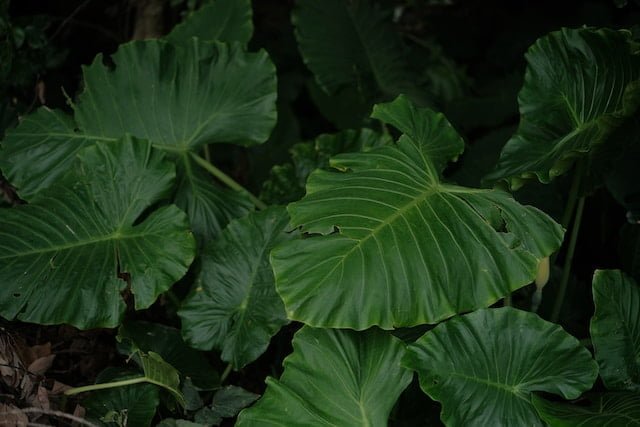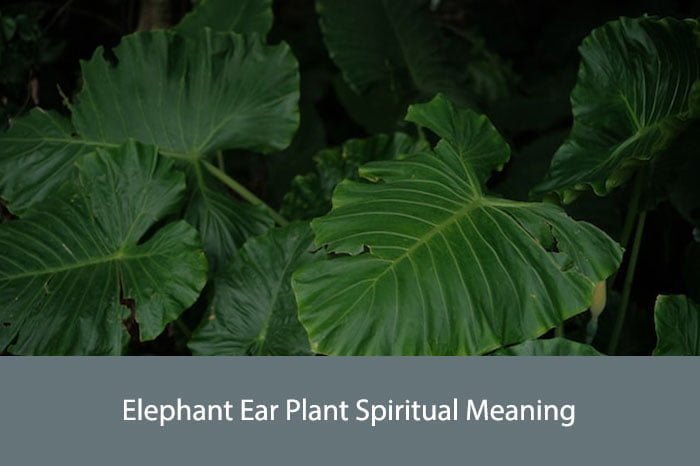Elephant ear plants, also known as Alocasia, have become increasingly popular in recent years as houseplants due to their striking foliage and easy care. However, these plants have a deeper significance beyond their aesthetic appeal. In many cultures, elephant ear plants hold spiritual meaning and are believed to bring good luck, prosperity, and protection.
In Hinduism, the elephant ear plant is associated with the goddess Kali, who is often depicted with a necklace made of elephant tusks. The plant is believed to represent her power and strength, and is often used in rituals and offerings to honor her. Similarly, in Feng Shui, elephant ear plants are thought to bring wealth and abundance into the home, as their large leaves are said to resemble elephant ears, which symbolize good luck and protection.
Overall, the spiritual meaning of elephant ear plants varies across cultures, but they are generally associated with themes of strength, protection, and prosperity. Whether you believe in these spiritual beliefs or simply appreciate the beauty of the plant, incorporating an elephant ear plant into your home can bring a sense of peace and positivity into your space.

Origins and Cultural Significance
Origins
The elephant ear plant (Colocasia esculenta) is native to Southeast Asia and Papua New Guinea. It has been cultivated for over 5,000 years and is a staple food in many tropical regions. In ancient times, it was also used for medicinal purposes and as a source of fiber for clothing and paper.
Cultural Significance
The elephant ear plant has a rich cultural significance in many parts of the world. In Hinduism, it is associated with the goddess Kali and is used in various religious ceremonies. In Africa, it is considered a symbol of fertility and is often used in traditional medicine to treat infertility.
In some cultures, the elephant ear plant is also associated with wealth and prosperity. It is believed that growing the plant in your home or garden can attract good luck and financial success.
The plant is also used in culinary traditions around the world. In Southeast Asia, the leaves are used to wrap food for steaming or grilling. In Hawaii, the root is used to make poi, a traditional staple food.
Overall, the elephant ear plant has a long and varied history of cultural significance across many different regions and traditions.
Symbolism of the Elephant Ear Plant
The Elephant Ear Plant is a popular houseplant known for its large, striking leaves. In addition to its aesthetic appeal, the plant is also rich in symbolism. Here are some of the meanings associated with the Elephant Ear Plant:
Prosperity and Wealth
The Elephant Ear Plant is often associated with prosperity and wealth. Its large leaves are said to resemble elephant ears, which symbolize good luck and financial success. In Feng Shui, the plant is believed to attract positive energy and bring good fortune to the home.
Protection
The Elephant Ear Plant is also thought to provide protection to the home and its inhabitants. Its large leaves are believed to create a shield against negative energy and evil spirits. In some cultures, the plant is used in rituals and ceremonies to ward off evil and protect against harm.
Fertility
In addition to its other meanings, the Elephant Ear Plant is also associated with fertility. Its large leaves are said to resemble the female reproductive organs, and the plant is believed to promote fertility and increase the chances of conception.
Overall, the Elephant Ear Plant is a powerful symbol with a rich history of meaning and significance. Whether you are looking to attract wealth and prosperity, protect your home, or promote fertility, this plant is a powerful tool for achieving your goals.
Spiritual Uses of the Elephant Ear Plant
Meditation
The elephant ear plant has long been used in meditation practices due to its calming and grounding properties. By incorporating the plant into your meditation space or ritual, you can create a more peaceful and centered atmosphere. The large leaves of the plant are also said to represent the idea of growth and expansion, making it a powerful tool for manifestation and visualization during meditation.
Cleansing and Purification
The elephant ear plant is also known for its ability to cleanse and purify spaces and individuals. Burning dried leaves or incorporating the plant into a smudging ritual can help to clear negative energy and promote a sense of renewal. Additionally, the plant is said to have a purifying effect on the air, making it a great addition to any home or workspace.
Healing Practices
In traditional medicine, the elephant ear plant has been used to treat a variety of ailments, including respiratory issues and inflammation. The leaves of the plant can be crushed and applied topically to reduce swelling and promote healing. Additionally, the plant is said to have a soothing effect on the mind and body, making it a valuable tool in relaxation and stress relief practices.
Overall, the elephant ear plant has a rich history of spiritual and medicinal use. By incorporating this powerful plant into your spiritual practices, you can tap into its many benefits and promote a greater sense of balance and well-being.

Caring for an Elephant Ear Plant
Planting
When planting an elephant ear plant, we should find a spot with partial shade or filtered sunlight. The plant prefers well-draining soil that is rich in organic matter. We should dig a hole twice as wide and deep as the plant’s root ball and loosen the soil at the bottom of the hole. After planting, we should water the plant thoroughly and add a layer of mulch around it to help retain moisture.
Watering and Feeding
We should keep the soil consistently moist but not waterlogged. We can water the plant deeply once a week, or more frequently in hot, dry weather. We should avoid letting the soil dry out completely, as this can cause the leaves to wilt and brown. We can feed the plant with a balanced fertilizer every two to three weeks during the growing season.
Common Problems
One common problem with elephant ear plants is overwatering, which can lead to root rot. To prevent this, we should ensure the soil is well-draining and not water the plant too frequently. Another issue is spider mites, which can cause yellowing and curling of the leaves. We can control spider mites by regularly spraying the plant with a solution of water and dish soap or neem oil. Finally, elephant ear plants are sensitive to cold temperatures and frost, so we should protect them during the winter months by bringing them indoors or covering them with a frost blanket.
That’s all we need to know about caring for an elephant ear plant. By following these simple steps, we can ensure that our plant stays healthy and vibrant for years to come.
Conclusion
In conclusion, the elephant ear plant has a rich spiritual meaning that has been recognized by many cultures throughout history. We have learned that the plant is associated with prosperity, abundance, and fertility, and is often used in rituals and ceremonies to attract good luck and positive energy.
We have also discovered that the elephant ear plant has a strong connection to the divine feminine, and is often associated with the goddesses of love, fertility, and motherhood. Its large, heart-shaped leaves are said to represent the nurturing and protective qualities of the feminine energy.
Furthermore, we have explored the various ways in which the elephant ear plant can be used for spiritual purposes, including as a talisman, a symbol, and a source of inspiration. Whether used in meditation, prayer, or simply as a decorative element, the plant has the power to uplift the spirit and connect us to the natural world.
Overall, the elephant ear plant is a fascinating and meaningful addition to any spiritual practice or collection. Its beauty, symbolism, and energy make it a valuable tool for those seeking to deepen their connection to the divine and cultivate a sense of abundance and prosperity in their lives.

Frequently Asked Questions
What are the benefits of having an elephant ear plant indoors?
Elephant ear plants can help purify the air in your home by removing harmful toxins and pollutants. They also add a touch of natural beauty and a calming presence to any room.
What is the spiritual significance of Alocasia plants?
In many cultures, Alocasia plants are believed to bring prosperity, good luck, and positive energy to the home. They are also associated with strength, resilience, and adaptability.
How does the elephant symbolize spiritual qualities?
Elephants are revered in many spiritual traditions for their wisdom, intelligence, and gentle nature. They are also seen as symbols of power, loyalty, and protection.
What are some Feng Shui tips for incorporating elephant ear plants in the home?
According to Feng Shui principles, placing elephant ear plants in the wealth area of your home can attract abundance and prosperity. They can also be placed in the health area to promote well-being and vitality.
What are the types of elephant ear plants that can be grown indoors?
There are several varieties of elephant ear plants that can be grown indoors, including Alocasia, Colocasia, and Xanthosoma. Each has its own unique characteristics and care requirements.
Are there any spiritual benefits associated with caring for elephant ear plants?
Caring for plants, including elephant ear plants, can be a meditative and grounding practice that promotes mindfulness and a connection to nature. It can also bring a sense of joy and fulfillment to your daily life.





